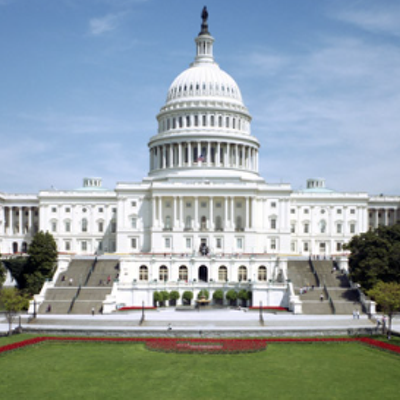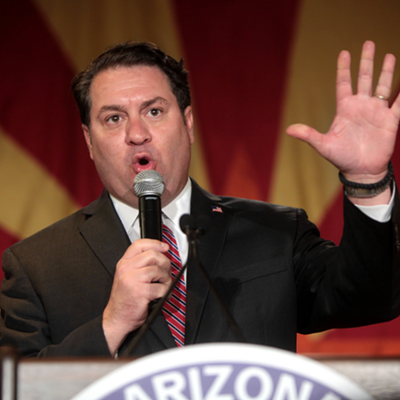Nuclear Reaction
McSally opposes Iran nuclear deal; her potential challengers say she's wrong
It looks all but certain that the Obama administration now has the support it needs to block Congress from undermining the recent nuclear deal worked out between Iran, the United States, Great Britain, France, Germany, China and Russia.
Arizona Republicans remain opposed to the agreement, which would relieve some international sanctions against Iran in exchange for limits on the country's ability to continue work on nuclear weapons.
Southern Arizona Congresswoman Martha McSally (R-CD2), who took a tour of Israel during the August recess, has argued that the deal has too many loopholes. "Instead of dismantling Iran's infrastructure, this agreement paves their way to a bomb in 13 years," McSally wrote in an Arizona Daily Star op-ed.
She said that the deal will lift sanctions and allow more money to flow to Iran, which will then be able to use those dollars to support terrorist activity.
McSally believes that the U.S. can persuade other nations such as Russia and China to hold sanctions in place while a new deal is worked out and argued that the current agreement "should be rejected, and the administration should be directed back to the negotiating table."
State Rep. Victoria Steele (D-Tucson) said McSally's idea of reopening the Iran nuclear talks is "not viable and it's not reasonable. This is not something that the U.S. gets to make all of the decisions on. This is part of an international group who in large part agree on most of the tenets of this deal."
Steele said the agreement is "not perfect" but it allows international inspectors to verify whether Iran is working on a nuclear bomb.
"It's all we've got," Steele said. "If we don't have this deal, we don't have anything."
Former state lawmaker Matt Heinz, a Democrat who also wants to challenge McSally next year, said McSally's opposition to the deal "sounds like it's political."
Heinz backs the Obama administration's contention that the Iran deal does allow appropriate inspections and will restrain the regime's efforts to go nuclear.
Like Steele, he was skeptical of McSally's suggestion that the Obama administration should return to the negotiating table.
"There is, at this point, no table to go back to," Heinz says.
If the U.S. tries to reopen the negotiations, "we will lose China, we'll lose Russia, we'll lose France and the European Union and other countries that have made it pretty clear that they are going to deal with Iran, with or without this agreement in place—and some cases, have been doing it already," he says.
Southern Arizona Congressman Raul Grijalva (D-CD3) supports the agreement.
"I'm not naive," Grijalva said. "Iran is not a good player, they're not the sweet little innocent person in the Middle East."
Nonetheless, Grijalva points to the support of the other nations involved in the negotiations and argues that the deal will slow any progress Iran can make toward a nuclear weapon and calls it "more than a risk worth taking. The other option is to prepare for war, to prepare for another major intervention into Iran as a means to try to end any nuclear development."
Both of Arizona's Republican senators, John McCain and Jeff Flake, oppose the deal.
Flake, who was thought to possibly be one of the few Republicans who might support the deal, said the agreement "does contain benefits in terms of limiting Iran's ability to produce sufficient fissile material for a nuclear weapon for a period of time, particularly at its known nuclear facilities. But these benefits are outweighed by severe limitations the (agreement) places on Congress and future administrations in responding to Iran's non-nuclear behavior in the region."
McCain said the nuclear agreement sends the message that the United States is looking to reduce its involvement in Middle East affairs.
"We know that our allies and partners in the Middle East have increasingly come to believe that America is withdrawing from the region, and is doing so at a time when Iran is aggressively seeking to advance its ambitions," McCain said last month during hearings on the nuclear deal. "Now we have reached an agreement that will not only legitimize the Islamic Republic as a threshold nuclear state with an industrial enrichment capability, but will also unshackle this regime in its long-held pursuit of conventional military power, and may actually consolidate the current regime's control in Iran for years to come."
Republicans have been united in opposition to the deal, but they have swayed relatively few Democrats to their side. As of Tuesday morning, at least 41 Democrats and independent senators had came out in support of the agreement, giving the Obama administration enough votes to filibuster any GOP-led efforts to push a motion of disapproval of the deal and more than enough to sustain a veto of the legislation should it pass Congress.
If you're interested in learning more about the deal, the Arizona Center for Judaic Studies has assembled a panel discussion of the "scientific, diplomatic and regional complexities involved in this transformational agreement."
"The Iranian Nuclear Agreement: Containment or Catastrophe?" will feature Professor Philip Pinto from the departments of Astronomy and Physics, Professor Faten Ghosn from the School of Government and Public Policy, and Professor Asher Susser from the Arizona Center for Judaic Studies, with Director of Judaic Studies J. Edward Wright and UA College of Science Dean Joaquin Ruiz on hand to moderate. The free event starts at 7 p.m. Thursday, Sept. 17, at UA's Crowder Hall.
City Hall Showdown
Catch televised debates of the City Council races beginning this weekend
The Tucson Weekly and Tucson Local Media are teaming up with KXCI-FM to bring you Tucson City Council debates on Zona Politics with Jim Nintzel. The first round features two-term Democratic Councilwoman Regina Romero facing Republican Challenger Bill Ward in the Ward 1 race. It airs this Sunday at 8 a.m. on the CW Tucson, Channel 8 on Cox and Comcast and Channel 58 on broadcast, DirecTV and the Dish Network and will also air at 5 p.m. Sunday on KXCI, 91.3 FM.
Zona Politics with Jim Nintzel is taking a summer break. The show will return with a new episode on Sunday, July 26, at 8 a.m. on KWBA, Channel 8 on Cox and Comcast and Channel 58 on DirecTV and broadcast.








